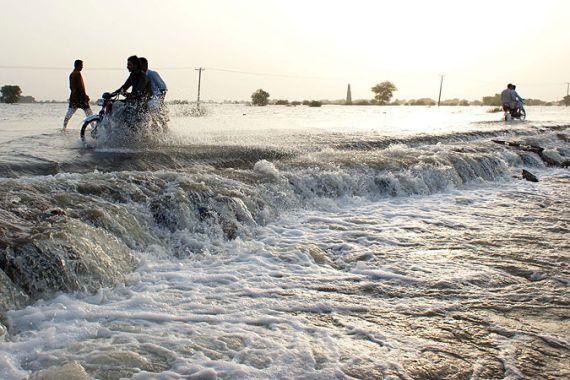UN seeks $2bn in Pakistan flood aid
Appeal for victims of Pakistan’s catastrophic floods sets record as biggest natural disaster appeal in UN history.

 |
| The UN’s latest call to raise funds is to help Pakistan recover from the massive floods in the next 12 months [AFP] |
The United Nations has made a fresh appeal to raise an additional $1.5bn in humanitarian aid to help Pakistan recover from crippling floods that have displaced millions of people.
The appeal, the largest-ever disaster appeal in UN history, was announced on Friday by Ban Ki-moon, the UN secretary-general.
Keep reading
list of 4 itemsAre seed-sowing drones the answer to global deforestation?
Rainfall set to help crews battling wildfire near Canada’s Fort McMurray
The Alabama town living and dying in the shadow of chemical plants
It follows the nearly $500m the world body had initially asked countries and organisations to donate after the onset of massive flooding nearly two months ago.
Previously the largest UN disaster aid appeal was $1.5bn for Haiti after a massive earthquake hit the Caribbean state in January.
“We have all been struck by the enormous scale of the crisis,” Ban said. “The human tragedy is immense and it is growing. The flood waters are [still] moving.”
‘Many crises’
Ban said Pakistan was “not facing just one humanitarian crisis, but many”.
“All of this makes the Pakistan floods the worst disaster the United Nations has responded to in its 65-year history,” he added.
The UN is seeking funding for food, health, education, shelter, water, sanitation and hygiene, as well as the operating of camps for displaced people, the recovery of the country’s farm sector, and rebuilding of communities.
|
“We must also do our part. We simply cannot stand by and watch the immense suffering in a disaster of this scale. We are seeing the equivalent of a new disaster every few days in Pakistan” Valerie Amos, UN humanitarian chief |
The revised appeal for Pakistan is to cover the needs of up to 14 million people for the next 12 months, a UN Office for the Co-ordination of Humanitarian Affairs (OCHA) statement said.
Valerie Amos, the UN humanitarian chief, said 80 per cent of the $460m in emergency aid requested on August 11 had been received.
“We must also do our part. We simply cannot stand by and watch the immense suffering in a disaster of this scale. We are seeing the equivalent of a new disaster every few days in Pakistan.
“Yesterday [Friday], new breaches of the embankments of Manchar Lake in Sindh flooded more villages. Millions of people have lost everything,” Amos added.
Al Jazeera’s Cath Turner reporting from the UN headquarters in New York said the four main sections where more money is needed are food security, shelter, water and sanitation, and health.
“Only 20-22 per cent of each of those categories has been satisfied, leaving huge shortfalls that need to be covered urgently. There are millions in desperate need of help who are not getting any.
“There has [also] been talk of donor fatigue… that the world was simply too tired of giving for such causes… there was the Haiti quake appeal earlier this year,” our correspondent said.
“The head of the global appeal campaign denied this saying the UN and the other agencies have not done enough to keep the story in the spotlight, which is what the launch of the revised appeal is meant to do… to draw the world’s attention back to the plight of the Pakistani people.”
Dependence on aid
Separately, the UN mission of Pakistan’s neighbour and rival, India, announced that it had given the UN $20m to be used in the Pakistan relief efforts. Last month it donated $5m for the same.
The floods in Pakistan began more than a month ago and swept through the country, leaving an area almost the size of England under water.
The OCHA said the floods have affected more than 20 million people, damaged or destroyed nearly 1.9 million homes and killed 1,700 people.
It said farmers who lost their crops and who are not able to plant their fields by November will likely remain dependent on aid until well into 2012.
Hundreds of thousands more people have also lost their shops or other small businesses, the OCHA statement said.
“The damage to the economic infrastructure and livelihoods is immense,” it added. “Irrigation, drainage and storage facilities are badly affected.”
Although the water is beginning to recede, large areas remain submerged and some villages in the southern province of Sindh are facing floods as the Indus River, swollen by heavy monsoon rains, flows south to the Arabian Sea.